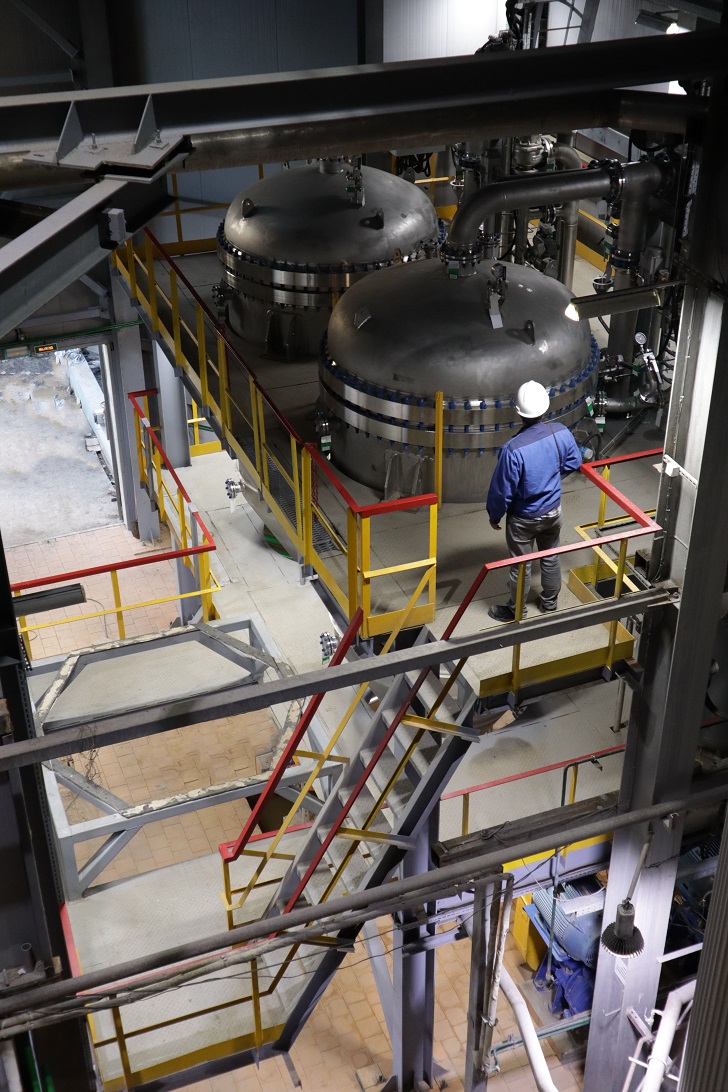
The sedimentation tanks at a Russian gold processing plant were not effectively removing foreign particles, causing increased wear to system components. A German solid-liquid filtration specialist used two simultaneously operated tube sheet candle filters instead to keep condensate clean during precious metal extraction.
Process Plants International (PPI), an Australian consulting firm that specialises in optimising, commissioning and maintaining plants in the mining and raw materials processing sector company, recommended BHS-Sonthofen and its candle filters to its Russian customer, Polymetal International (PI), a gold processing plant in Amursk, Russia.
PI needed support to expand the capacities of its plant. Pressure oxidization reactors with a closed water circulation system are used in one process step of gold extraction. Foreign particles must be continuously removed from the condensate coming from the flash tank to prevent clogging and wear.
Foreign particles The Russian company had previously used sedimentation tanks to remove sulfide dust, mineral ores and other undesirable particles from the condensate. The condensate was pumped into the tank and remained there for some time, allowing undesirable foreign particles to sink to the bottom. However, some particles would still end up back in the water circulation system due to their small size and slow sinking behaviour. This resulted in foreign particles causing increased wear to delicate system components such as heat exchangers.
PPI decided to test out an alternative process within the framework of the company’s planned capacity expansion of the plant. The first pilot tests showed positive results. PPI opted for BHS-Sonthofen, a company with more than 60 years of experience in solid-liquid filtration. Christian Gassen, area sales manager in the Filtration Technology division at BHS-Sonthofen, said of the first stage of the collaborative project with PPI: “Using the data we had collated from the preliminary tests, we were able to suggest a filter combination that impressed the customer.”
BHS-Sonthofen decided on two simultaneously operated tube sheet candle filters to replace the sedimentation tanks. These remove almost all foreign particles from the condensate and ensure a clear filtrate and less wear. The tube sheet design is usually used for applications where the filter cake comprises sludge discharge and this was the case with the Russian customer. It offers the advantage of a simpler candle filter design, with only one filtrate outlet resp. a single filtrate valve and fewer fittings. This means a system with fewer fragile components as well as a less effort for automation and maintenance work, which, in turn, improves the overall process reliability. The pre-existing filter presses downstream of the BHS candle filters produce a solid filter cake for easy disposal.
Challenges The challenges in implementing this project included the high flow of approximately 400 m3 per hour and the objective of achieving a clear filtrate, as well as the highly corrosive properties of the condensate stream. This combination of factors called for durable, high-quality candle filters. “The super duplex steel built into the filters is corrosion resistant to the highest degree, but it is also difficult to process,” explained Gassen. “Large metal plates are needed for a tube sheet design with a filter surface of 110 m² per filter. Given the chosen steel quality, this posed a challenge to the engineers and steel workers. That’s why we’re even more satisfied with the result.”
International co-operation BHS worked in close co-operation with PPI to design and manufacture the filters. BHS was commissioned to produce the candle filters, including the necessary internal piping and instrumentation, but not the steel structure. The final assembly will be carried out on site in Russia with local partners.
BHS-Sonthofen did not merely rely on preliminary tests when drawing up the filters’ dimensions. A small pilot test system was installed in Amursk to test previously selected filter cloths in real working conditions. The tests were supervised by BHS employees and Australian employees from PPI in early 2018. They confirmed the proper design and choice of components.
PPI also performed the project acceptance in Germany and was responsible for delivering the candle filters. The experts at BHS were invited to a meeting in Australia to ensure that commissioning in Russia would go as smoothly as possible. All questions related to the operation and safety of the system were discussed in detail and documented for the end customer. Gassen is very pleased with how the project has gone so far: “When you think about the fact that people from three different continents worked together on this plant, the positive results underscore the high degree of professionalism across the board.”
Two large candle filters for removing foreign particles from the condensate stream in pressure oxidation reactors were delivered by PPI at the end of April. They do not simply replace the previous technology, but optimise the whole process.






